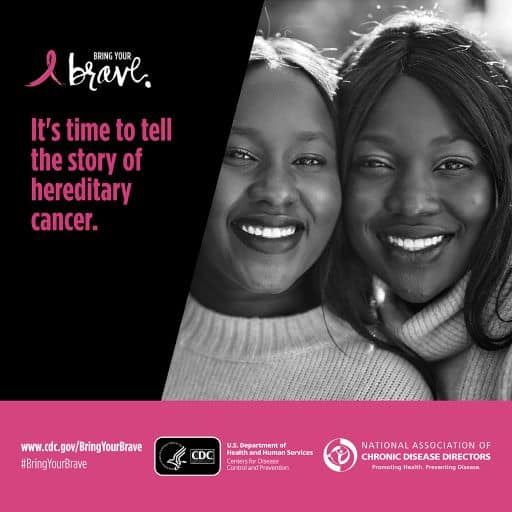Don’t put off conversations about hereditary cancer

Knowing your risk is the best way to protect yourself and your family
Each year, more than 250,000 women and about 2,300 men in the United States learn that they have breast cancer, and nearly 20,000 women find out that they have ovarian cancer. Most of these cancers occur by chance or because of risk factors like smoking. But some are hereditary, meaning that they are caused by genetic changes (called mutations) which are passed down in families. Learning about your family’s history of cancer is the first step toward understanding your own risk and taking preventive measures.
But starting the conversation is not always easy. Some families and cultures are reluctant to talk about personal health matters. Some individuals may just want to avoid the conversation out of fear or a belief the topic doesn’t apply to them. Regardless, finding ways to get the conversation going is critical, especially for young women.
Although most breast cancers are diagnosed in older women, about 9% of all breast cancer cases are found in women younger than 45 years of age. It’s particularly important for young women to learn about their family history, understand their risk, and live a breast-healthy lifestyle.
What should I be talking about with family?
The first step is to collect any history of cancer in your family to share with your doctor. Include your parents, sisters, brothers, children, grandparents, aunts, uncles, nieces, and nephews. List any cancers that each relative had and at what age he or she was diagnosed. If your family history shows that you may be at higher risk for hereditary breast and ovarian cancer (HBOC), your doctor may refer you for genetic counseling and testing. At that time, you may want to urge family members to talk to their own doctors about counseling.
If, after genetic testing, you are diagnosed with HBOC, the conversation with your family is even more important. The diagnosis means you carry one or more genetic mutations that increase your cancer risk. And this means your parents, children, sisters, and brothers each have a 50% chance of carrying the same genetic mutation. While this may not be the easiest news to share, a frank conversation with family members is the best way to protect them.
What if my family doesn’t want to talk about HBOC?
All families are different. For some, illness is hard to talk about. Others are comfortable discussing it at the dinner table. Only you can determine the right setting and the right way to approach the conversation. A few tips:
- Focus on the fact that information is power. Knowing you might have a hereditary condition can be scary, but if you know, you can take steps to protect yourself and the people you love.
- Assure them that genetic testing is a personal decision. If they do decide to talk to a genetic counselor, they can make their own decisions based on the results.
- Invite family members to attend doctor’s appointments with you and ask questions. Some may already know about the family history, but not understand what it means for them or what they can do to take control of their own health.
Find inspiration in others’ stories
Talking about hereditary cancer can be daunting. You may benefit from listening to the stories of other women who have overcome challenges to confronting what is a difficult topic for almost everyone. This Web page has links to more than 20 video stories, as well as other resources to help you get the conversation going.
Visit CDC’s Bring Your Brave campaign for more.
Watch these inspiring videos!
In a series of compelling videos, more than 20 women share how they got the conversation going about hereditary breast and ovarian cancer, overcame fears of talking to family and doctors, made choices about genetic testing and prevention, and felt empowered about their health.
Explore the videos at CDC’s Bring Your Brave site
6 reasons families may avoid talking about hereditary cancer
- Fear of conversations or tests that might ultimately lead to bad news
- Lack of understanding of how one family member’s health might impact another’s
- Guilt felt by older family members who have already had cancer and fear they may pass it on
- Cultural norms in some communities that discourage talking about bad things that might happen
- Desire to push this type of conversation further into the future and not worry about it today
